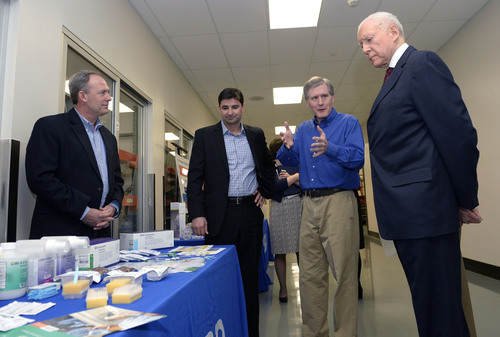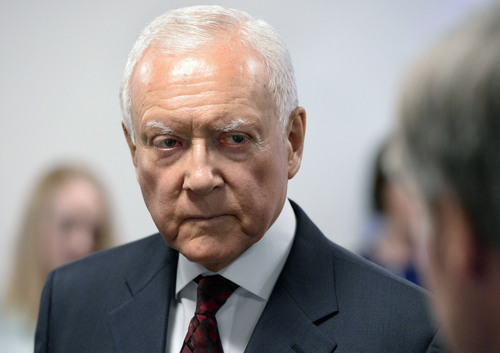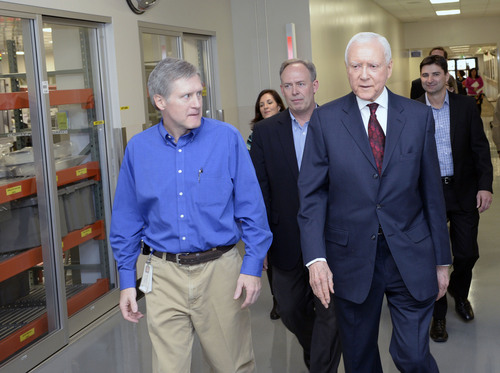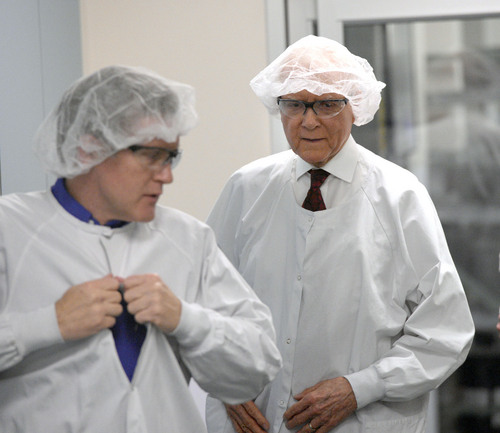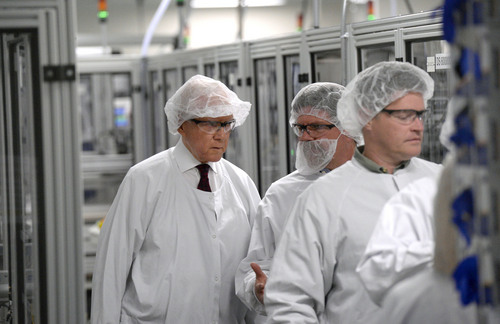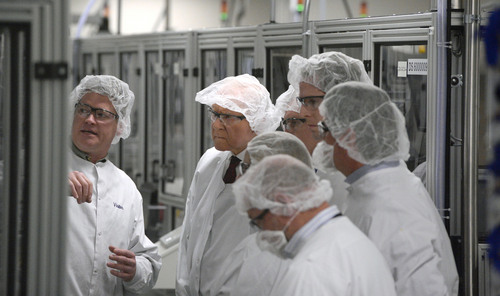This is an archived article that was published on sltrib.com in 2014, and information in the article may be outdated. It is provided only for personal research purposes and may not be reprinted.
Sandy • A tax imposed on medical-device manufacturers to finance the Affordable Care Act is making it harder for industry leaders such as BD Medical to compete in a global marketplace, Sen. Orrin Hatch said Wednesday.
The 2.3 percent excise tax on gross sales of products, including BD's market-dominant intravenous catheters, "injures all the innovative companies that do medical devices," the seven-term Republican senator said after touring the company's manufacturing plant in Sandy, directly south of Rio Tinto Stadium.
But to raise $30 billion in tax revenues "so they can make the phony claim that Obamacare is self-sufficient," Democrats in the administration and Congress are stifling research and development, Hatch said. They are slowing the creation of jobs, he added, and forcing medical device companies to move their plants overseas and to seek larger markets in foreign countries.
Gary Shearer, BD Medical's vice president of manufacturing, said the excise tax would cost his company $55 million annually — and leave it in a weaker position in a competitive environment by reducing research and manufacturing capacity.
"It hurts future growth," he said, reversing a trend that has seen this operation grow steadily since its inception in 1956 as Deseret Pharmaceuticals. That company was acquired 30 years later by BD, which has more than 31,000 employees worldwide, including 12,000 in the United States.
The Sandy plant is the largest of the company's 30 facilities in the U.S. It now covers 540,000 square feet — "I tell people we could have 11 Super Bowls under our roof," Shearer said — and employs almost 1,000 people in around-the-clock shifts.
Tax proponents contend, however, President Obama's health care plan will increase business for medical device companies such as BD, offsetting the tax impacts.
The liberal-leaning Center on Budget and Policy Priorities also disputed Hatch's dire prognosis, contending the tax applies equally to imported and domestically produced devices and may actually spur innovation as companies search for more cost-effective products.
Examples of innovative thinking were evident throughout the manufacturing plant where Hatch and an entourage of followers watched as medical devices of symmetrical precision were churned out.
To get in, the delegation dressed up in hair nets and clean cloaks. The members all washed their hands to reduce further the risk of introducing troublesome germs, then circulated among glass-enclosed conveyor belts that wheeled a four-pack of catheters, like skiers on a lift, from one station to another.
Screens overhead bore magnified images of the work that went on at each station, making sure parts fit just right, rejecting catheters that are even a smidgen off.
"We want the doctors and nurses all over the world to have the same experience with our products every single time," said engineering supervisor Spence Cornia, "and to have confidence that it's going to work properly every single time."
Hatch said it's frustrating that the excise tax will threaten this type of innovation, which has led to the development of so many life-saving, life-improving products.
Kimball Thompson, CEO of BioUtah, an association of companies in the life-sciences industry, said the tax would impact many of its 120 members. He gave Hatch the association's inaugural public service award for his work to help the industry.
Hatch already has close ties to the industry.
Campaign financial information from OpenSecrets.com, which is operated by the Center for Responsive Politics, showed that pharmaceutical and health products companies were the second largest contributors to Hatch's campaign coffers in the 2014 election cycle.
Those industries have contributed just more than $1 million, second only to securities and investment companies, according to the center's website.


